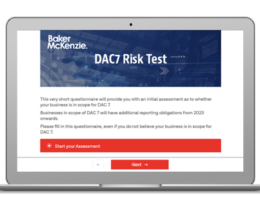Interested parties could, until 6 April 2022, provide their views to the EU Commission regarding the so-called Unshell proposal or ATAD 3. Many will have flagged the uncertainties about certain concepts and the need for more clarifications while others will also have indicated more substantial issues such as possible non-compatibility with EU Law. It remains to be seen whether the EU Commission will take (some of) these comments on board. Meanwhile, international groups should not rest on their laurels because it is likely that the Proposal will be adopted (as is or in an amended form) but rather start screening the European affiliates in their corporate structure, to identify possible issues under ATAD 3 and look for possible remedies.
Last year, Belgium introduced DAC 7 “light” reporting obligations for digital platform operators in the sharing and gig economy in anticipation of the implementation of the EU DAC 7. The legal provision that implemented the DAC 7 “light” reporting obligations remained vague however and left open quite some questions in practice with further implementation measures that needed to be taken. The Belgian tax authorities published a FAQ on Monday 14 January 2022. the FAQ clarifies the legislation and provides for the necessary implementation measures in view of the first reporting deadline, which is 31 March 2022.
In March 2021, the EU approved new reporting rules in a directive known as DAC7. The directive will require the operators of online platforms for the sale of goods and certain services, to collect, verify and share data on their sellers and their transactions concluded on the online platform. EU member states have until 31 December 2022 to implement DAC7 into national law. Certain platform operators will become a reporting platform and will need to start collecting and verifying data points in compliance with the DAC7 reporting requirements. The collected data points must be reported to the tax authorities of the relevant EU member state annually.
Following a new bill, the Belgian tax authorities have the right to request taxpayers who keep their books and records digitally to submit them through a secured online platform. This new provision lowers the barrier for the Belgian tax authorities to perform a tax audit and could thus possibly increase the number of tax audits in the future. This would also result in a substantial increase of digital data available to the Belgian tax authorities, which allows datamining in relation to the information submitted and therefore more efficient tax audits.
With the rise of digital platforms and the possibilities internet provides for businesses, more and more sellers are able to offer goods and services via these platforms and the internet. In this context, it has become difficult for tax authorities to trace the flow of goods and services as well as to identify sellers to ensure that these goods and services are taxed in accordance with EU tax principles.
Welcome to our first quarter issue of the Private Wealth Newsletter. Our featured insight for this issue is a discussion of the passage of the Corporate Transparency Act by the United States to introduce federally-mandated beneficial ownership reporting obligations for US corporations and limited liability companies. We also include insights…
In anticipation of the EU DAC 7 initiative, Belgium has recently introduced “DAC 7 light” reporting obligations for digital platform operators in the sharing and gig economy. The goal is to render the income realized by service providers through these platforms more transparent and to prevent avoidance or fraud from a tax and social security perspective.
A new and extended version of the Securities Account tax was introduced in Belgium by the Law of 17 February 2021 that entered into force on 26 February 2021. The new tax takes the form of an annual tax of 0.15% on securities accounts that exceed EUR 1 million in average value (this includes financial instruments as well as the cash balance). The tax will first be due for the reference period starting on 26 February 2021 and ending on 30 September 2021.
A recent Law has shortened the initial period to which losses incurred by Belgian taxpayers in the course of the COVID-19 crisis can be carried back under the general one-off loss carry-back regime from December 31, 2020 to July 31, 2020 Read about it in our newsflash.
Following the recent outbreak of COVID-19 and the financial impact of the health measures that were necessary in response thereto, different support measures have been adopted in Belgium to alleviate the cash flow issues and the financial difficulties that companies, enterprises and self-employed individuals are facing as a result of…






